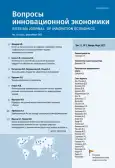The role of universities in the innovative development of Russian business
- Authors: Serebrennikov S.S.1, Ivanova N.M.1, Orlov M.A.1
-
Affiliations:
- RANEPA
- Issue: Vol 13, No 1 (2023)
- Pages: 439-452
- Section: Articles
- URL: https://journals.eco-vector.com/2222-0372/article/view/608108
- DOI: https://doi.org/10.18334/vinec.13.1.117032
- ID: 608108
Cite item
Abstract
Amidst the development of the digital economy, digital competitiveness is of great importance for the economic security of the country. The COVID-19 pandemics and subsequent crisis phenomena, measures specifically taken by the state, the desire to obtain competitive technologies through modern information technology, as well as the general interest of stakeholders are forcing Russian business to embark on the path of digital transformation. In the article, the authors analyze the conditions that encourage organizations of various industries to create conditions for the creation and implementation of digital innovations. Based on the study of modern practice, the role of higher education institutions in the formation of an innovative agenda and training for digital transformation is determined.
About the authors
Sergey Sergeevich Serebrennikov
RANEPA
Email: serebrennikov-ss@ranepa.ru
Natalya Mikhaylovna Ivanova
RANEPA
Email: ivanova-nm@ranepa.ru
Mikhail Aleksandrovich Orlov
RANEPA
Email: orlov-ma@ranepa.ru
References
- Richter A. Locked-down digital work // International Journal of Information Management. – 2020. – p. 102157.
- Блохина М. С. Инновационные компетенции в структуре требований к современным руководителям // Вестник Нижегородского университета им. НИ Лобачевского. Серия: социальные науки. – 2016. – № 2 (42). – c. 149-158.
- О Стратегии развития информационного общества в Российской Федерации на 2017-2030 годы: Указ Президента РФ от 09.05.2017 № 203. [Электронный ресурс]. URL: http://www.kremlin.ru/acts/bank/41919 (дата обращения: 23.12.2022).
- Conceição P. Beyond the digital economy: A perspective on innovation for the learning society // Technological Forecasting and Social Change. – 2001. – № 2-3. – p. 115-142.
- Koutroumpis P. The economic impact of broadband on growth: A simultaneous approach // Telecommunications Policy. – 2009. – № 9. – p. 471-485.
- Czernich N. Broadband infrastructure and economic growth // The Economic Journal. – 2011. – № 552. – p. 505-532.
- Kongaut C., Bohlin E. Impact of broadband speed on economic outputs: An empirical study of OECD countries // Economics and Business Review. – 2017. – № 2. – p. 12-32.
- Van Dijk J., Hacker K. The digital divide as a complex and dynamic phenomenon // The information society. – 2003. – № 4. – p. 315-326.
- UNCTAD. Catching technological waves: Innovation with equity. Technology and innovation report 2021// United Nations publication – 2021
- IMD W. IMD World Digital Competitiveness Ranking 2021. [Электронный ресурс]. URL: https://www.imd.org/centers/world-competitiveness-center/rankings/world-digital-competitiveness (дата обращения: 23.12.2022).
- Янченко Е.В. Влияние цифровой экономики на инновационное развитие человеческого потенциала российского общества: возможности и ограничения // Вопросы инновационной экономики. – 2020. – № 2. – c. 849-866.
- Иванова Н. М., Орлов М. А. Инновационное развитие российского бизнеса в условиях пандемии COVID-19 // Вопросы инновационной экономики. – 2022. – № 2. – c. 771-784.
- Heinonen K., Strandvik T. Reframing service innovation: COVID-19 as a catalyst for imposed service innovation // Journal of Service Management. – 2020.
- Прохорова В. В., Схаплок Р. Б., Власов М. И. Адаптация организаций к неблагоприятной экономической ситуации, сложившейся в результате пандемии COVID-19 // Инновационная экономика: перспективы развития и совершенствования. – 2021. – № 3 (53). – c. 92-97.
- Kohtamäki M. The relationship between digitalization and servitization: The role of servitization in capturing the financial potential of digitalization // Technological Forecasting and Social Change. – 2020. – p. 119804.
- Zhou D. Exploring how digitalization influences incumbents in financial services: The role of entrepreneurial orientation, firm assets, and organizational legitimacy // Technological Forecasting and Social Change. – 2021. – p. 121120.
- Chae H. C., Koh C. E., Prybutok V. R. Information technology capability and firm performance: contradictory findings and their possible causes // MIS Quarterly. – 2014. – № 1. – p. 305-326.
- Carayannis E. G., Provance M. Measuring firm innovativeness: towards a composite innovation index built on firm innovative posture, propensity and performance attributes // International Journal. – 2008. – № 1. – p. 90-107.
- Серебренников С.С. Преодоление дисбалансов экономических систем в интересах укрепления их безопасности. - М.: Русайнс, 2021. – 87 c.
- Paul J. J. Graduates in the knowledge and innovation society // The flexible professional in the knowledge society. – 2011. – p. 11-137.
- Knabb S. D., Stoddard C. The quality of education, educational institutions, and cross‐country differences in human capital accumulation // Growth and Change. – 2005. – № 3. – p. 354-373.
- Kesting P., Ulhøi J. Employee‐driven innovation: extending the license to foster innovation // Management Decision. – 2010.
- Collins R. Collaborative circles: Friendship dynamics and creative work. – 2004
- Organisation for Economic Co-operation and Development. Knowledge management in the learning society. – OECD Publishing, 2000
Supplementary files











